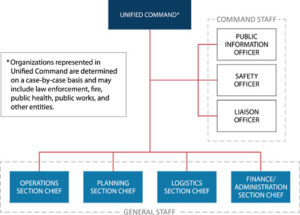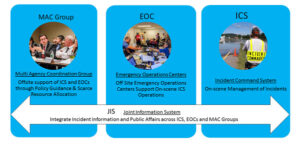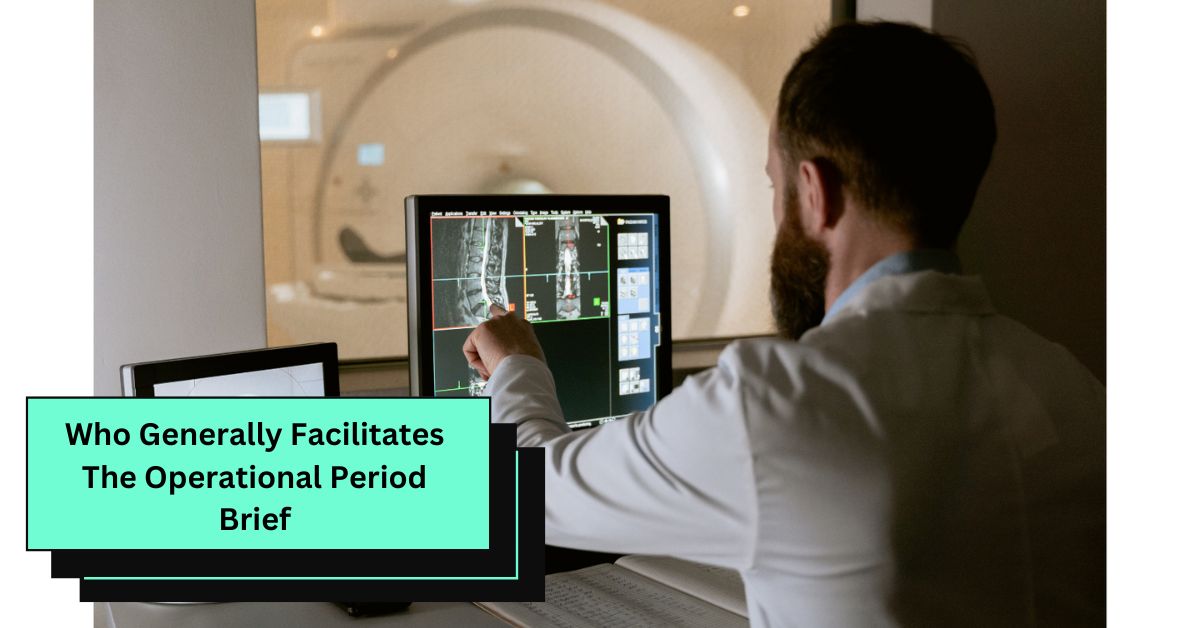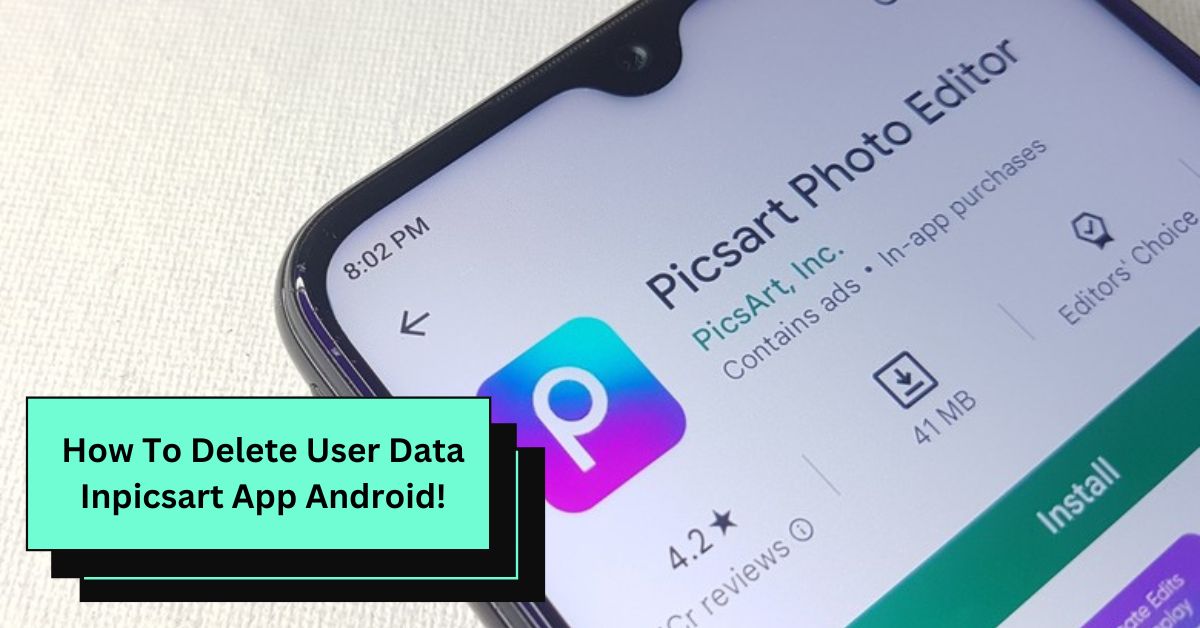As the unpredictable nature of emergencies and disasters continues to challenge communities and organizations, the need for effective incident management has never been more crucial.
The Incident Command System (ICS) stands as a beacon of structured response, and within this system, the Operational Period Brief (OPB) emerges as a linchpin for coordinating diverse entities.
This article explores the multifaceted role of the Incident Commander (IC) in facilitating the OPB, delving into specific responsibilities and emphasizing the far-reaching impact of this critical leadership position.
The Foundation: Incident Commander’s Role in ICS:
Establishing Command Authority:
At the onset of an incident, the IC assumes command authority, becoming the central figure responsible for overall decision-making.

This authority extends to the facilitation of the OPB, where the IC’s leadership sets the tone for the entire response effort.
Unified Command Approach:
In larger incidents involving multiple agencies or jurisdictions, a Unified Command approach may be adopted, with multiple ICs working collaboratively. Regardless of the model, one IC takes the lead in facilitating the OPB, ensuring a unified and coordinated response.
In-Depth Analysis: Operational Period Brief Components:
Situation Assessment:
The IC begins the OPB by providing a comprehensive assessment of the current situation. This includes details such as incident size, affected areas, and any potential threats. Real-time information and data are critical in shaping an accurate understanding of the incident’s dynamics.
Objectives and Strategies:
Setting clear objectives and strategies is a hallmark of effective incident management. During the OPB, the IC articulates specific goals for the upcoming operational period and outlines the strategies to achieve them. These objectives serve as guiding principles for all responding entities.
Resource Management and Allocation:
Efficient resource management is a dynamic process that evolves as the incident unfolds. The IC details resource allocation during the OPB, considering factors such as personnel, equipment, and facilities. This strategic deployment ensures that resources are used optimally to address emerging needs.
Risk Assessment and Mitigation:
Recognizing and mitigating risks is integral to the safety of responders and the success of the operation. The IC conducts a risk assessment during the OPB, identifying potential hazards and outlining measures to mitigate these risks. This proactive approach enhances the overall safety of the response effort.
Read Also: moviesjoy plus
Operational Excellence: Key Components of the IC’s Role:

Unified Communication Protocols:
Effective communication is the backbone of any successful response. The IC establishes and reinforces communication protocols during the OPB, ensuring a unified and standardized system. This fosters seamless information exchange and minimizes the risk of misunderstandings.
Incident Documentation:
Comprehensive documentation is a cornerstone of effective incident management. The IC ensures that accurate records are maintained during the OPB, including decisions made, resource allocations, and key developments. This documentation serves as a valuable resource for post-incident analysis and improvement.
Adaptability and Flexibility:

The dynamic nature of emergencies requires the IC to be adaptable and flexible. During the OPB, the IC may need to adjust strategies based on new information or changing circumstances. This ability to pivot in real-time contributes to the overall resilience of the response effort.
Read Also: bato manga
FAQ’s By Who Generally Facilitates The Operational Period Brief
1. Who assumes command authority at the onset of an incident?
The Incident Commander (IC) takes on command authority, responsible for overall decision-making.
2. What is the significance of the Unified Command Approach in larger incidents?
In larger incidents, the Unified Command Approach may be adopted, involving multiple ICs working collaboratively to ensure a unified and coordinated response.
3. What is the primary focus of the IC during the Operational Period Brief (OPB) Situation Assessment?
The IC provides a comprehensive assessment, including incident size, affected areas, and potential threats, to shape an accurate understanding of the incident’s dynamics.
4. Why are clear objectives and strategies crucial in incident management?
Clear objectives and strategies, articulated by the IC during the OPB, serve as guiding principles for all responding entities, ensuring a focused and coordinated response.
5. What factors does the IC consider during Resource Management and Allocation in the OPB?
The IC details resource allocation, considering factors such as personnel, equipment, and facilities, to ensure optimal use in addressing emerging needs.
6. Why is Risk Assessment and Mitigation integral to the OPB?
The IC conducts a risk assessment during the OPB to identify potential hazards and outlines measures to mitigate these risks, enhancing overall safety in the response effort.
7. What role does effective communication play in incident response?
Effective communication, established and reinforced by the IC during the OPB, is crucial for a successful response, fostering seamless information exchange and minimizing the risk of misunderstandings.
8. Why is Incident Documentation considered a cornerstone of effective incident management?
The IC ensures comprehensive documentation during the OPB, including decisions made, resource allocations, and key developments, serving as a valuable resource for post-incident analysis and improvement.
9. How does the IC demonstrate adaptability and flexibility during the OPB?
The dynamic nature of emergencies requires the IC to adjust strategies based on new information or changing circumstances, contributing to the overall resilience of the response effort.
10. What multifaceted responsibilities does the IC have in the facilitation of the OPB?
The IC’s responsibilities include assessing the situation, setting clear objectives, managing resources efficiently, ensuring unified communication, and demonstrating adaptability.
11. What is the long-term impact of the IC’s leadership during the OPB?
The IC’s leadership not only shapes the ongoing response but also lays the groundwork for future improvements in emergency management.
12. How does the IC’s ability to navigate crises underscore the indispensable nature of their position?
The IC’s adeptness in crisis response, coupled with strategic communication and adaptability, highlights the indispensable nature of their leadership in safeguarding communities and organizations during times of need.
Conclusion On Who Generally Facilitates The Operational Period Brief
In summary, the Incident Commander’s role in facilitating the Operational Period Brief is multifaceted, ranging from assessing the current situation to efficient resource management and unified communication. Positioned at the forefront of incident management, the IC’s leadership not only shapes the ongoing response but also paves the way for future improvements. As the cornerstone of the ICS, the IC’s ability to navigate crises, coupled with strategic communication and adaptability, highlights the indispensable nature of this leadership position in safeguarding communities and organizations during times of need.
Read Also:
jetnet login
Geddy Lee Net Worth – Let’s Explore!


